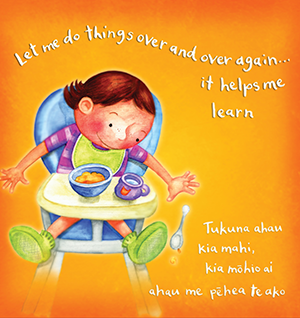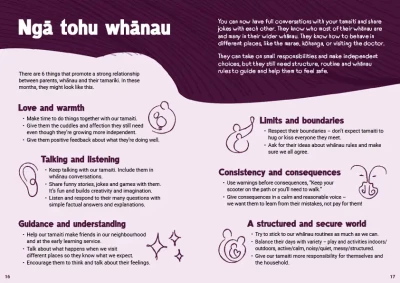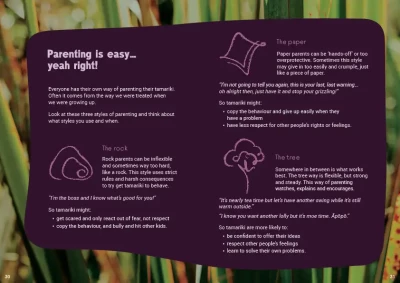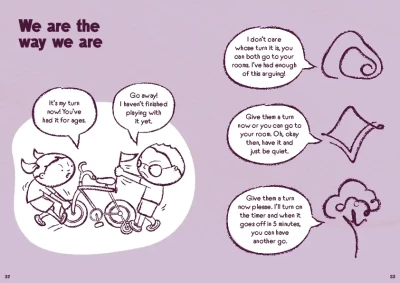
Learning self-control
It can be difficult for tamariki to practice self-control. But with the help of whānau, there are things they can do to develop this skill, which will help them throughout life.
Managing feelings
Have a look at the tamariki squabbling over whose turn it is on the bike in the Whakatipu Te Māhuri booklet, pages 32 and 33.
They need help with sharing the bike, and they need help with managing their feelings.
Ask whānau:
- Is there anything familiar to you about this picture?
- Have you been noticing anything similar in your tamaiti?
- How does sharing with other tamariki go for your tamaiti?
- What happens when there are strong feelings involved?
Tamariki are still learning about these things, and whānau can help.
Building their skills
Every time whānau play games where people take turns, tamariki are learning that when they’ve had their turn, it’s someone else’s turn and then it will be their turn again.
They can usually wait for a short time, and they can cope with the wait without getting anxious, upset or angry.
Tamariki who are able to do this are practising self-control.
Before age 3, it’s normal for tamariki to find waiting a struggle. Tamariki are able to wait for a very short time. It’s normal, too, for them to react to having to wait.
Ask whānau:
- What strategies have you tried if sharing or waiting have been an issue?
‘ Ka pai ’ to any whānau who’ve helped their tamaiti to wait for their turn and to stay reasonably calm!
Research suggests that learning self-control when they’re young will influence a child’s relationships with others and their ability to achieve their goals in life.
Parenting styles
Have a look at Te Māhuri, pages 30–31.
This is all about our parenting styles: rock, paper or rākau ?
Ask whānau:
- What do you think about the rākau approach?
Rākau style parenting follows the 'six things children need' to grow into happy, capable adults. The 'Ngā tohu whānau' section on pages 16–17 of Te Māhuri outline these six principles for raising happy and capable children:
- Love and warmth – Building and maintaining trust by doing what we say we’ll do. Waiting and sharing works best when tamariki trust the grown-ups.
- Talking and listening – Using a calm voice, listening to our tamaiti and explaining carefully so they understand.
- Guidance and understanding – Understanding that tamariki this age are learning to use self-control and it’s a work in progress; it’s like a ‘muscle’ that gets stronger with practice.
- Limits and boundaries – There is a way both tamariki can enjoy riding the bike: by sharing it.
- Structured and secure world – Problems can be solved when whānau understand and help. Tamariki learn about give-and-take, and that means everyone can have fun.
- Consistency and consequences – If tamariki can’t make the sharing plan work, what would be a reasonable and related consequence?
Tamariki can apply strategies they learn for waiting and for managing their emotions to many other situations, further strengthening their self-control ‘muscle’.
Helpful resources for whānau
-
All About Self Control (song for kids about controlling your body and words)<
All About Self Control (song for kids about controlling your body and words)
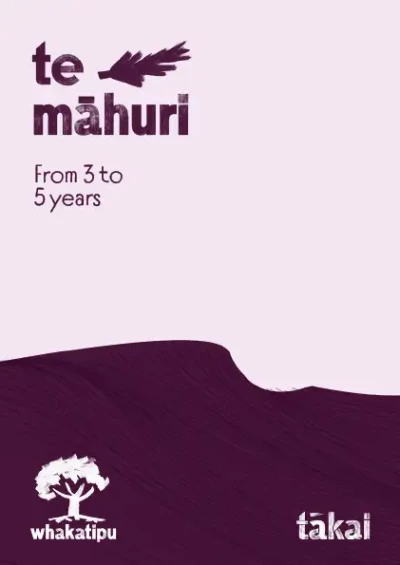 pdf 11 MB
pdf 11 MB
